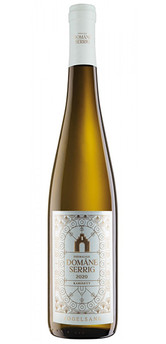Wine Shop
Domane Serrig Vogelsang Kabinett 2020 (750ML)
Other Details
Critic Scores, Reviews & Descriptions
97+ DB / 97 WA / 95 JS / 95 VM
(100% Riesling; from a legendary estate established by Kaiser Wilhelm II in 1904 on the incredibly steep slate slopes of the Saar river valley; 10.5% alcohol). 1st release and exclusively via La Place de Bordeaux. Basket pressed and vinified in a combination of oak barrels and stainless steel (though with essentially no residual impression of oak in the profile of the wine). Bright, fresh, bitingly zingy with lots of grapefruit pith and zest, gooseberry, a subtle hint of flinty-stony minerality, nettles, sage and wild oregano. Radiant and ultra-juicy on the astonishingly vivid attack, but then with a fabulous energising release of ripples and rivulets of concentrated citrus sapidity. Quite saline on the finish, accentuating the chiselled and gently tapering contours of this sublime wine. A lovely little touch of tannin too. Incredible. I really love the purity, precision and yet amazing intensity. - Colin Hay, Drinks Business
Basket pressed and vinified in traditional oak and stainless steel, the 2020 Vogelsang Kabinett is pure, bright and fresh on the highly delicate and flinty nose that shows precise and elegant fruit intertwined with the serious, flinty minerality of the gray and red slate soils of the domaine plus coolish vegetal nuances of nettles and mint. Round and intense yet light and filigreed on the palate, this is a pure, lush and round yet also very mineral, beautifully playful and palate-tickling Kabinett with less reduction than Molitor's Kabinetts usually show at this early stage. The sweetness is discreet and counterpointed by the immense mineral and saline drive. The finish is spectacularly long and tensioned, extremely complex and stimulating even at this age. This classic Kabinett reminds me of finest Scharzhofberger Kabinetts from Egon Müller. It is straight, sustainably saline, aromatic and charming. 10.5% stated alcohol. Natural cork. Tasted at the domaine in September 2023. - Stephan Reinhardt, Wine Advocate
Very fresh and delicate nose of an entire garden of herbs, yellow grapefruit and pomelo. Juicier than the nose suggested with stacks of white tree fruits and citrus zest freshness on the medium-bodied palate, this is a youthful and very elegant riesling for the 2020 vintage. Emphatically dry and long for this theoretically off-dry category, but also finely etched. This has just reached its best youthful drinking form, but the party has only just begun! Drink or hold. - James Suckling
The 2020 Riesling Serriger Vogelsang Kabinett is subtle on the nose, opening with smokier hints of slate that still clouds lemon and riper, juicier notions. It is on the palate that the full playfulness of that fruit becomes apparent: this is a Kabinett in a classic sense, off-dry rather than outright sweet, with tender notions of sweetish Mirabelle, citrus blossom and mandarin juice, encompassed by a stony, citric verve. Such lightness, such elegance, such poise, such brightness. The finish flickers with an overtone of pineapple, as befits the sunny 2020 vintage, but retains tone, tension and, above all, flavor. (Off-dry) -- Anne Krebiehl MW, Vinous Media
"The two 2020s—Kabinett and Grosse Lage (Grand Cru), which were handpicked, pressed on the basket press, fermented spontaneously and aged in large wooden barrels—are of terrific quality and style, suggesting that wines will continue to be made here that can rival those of Egon Müller in quality, the previous untouchable icon not only of the Saar but of all Germany. It is probably not exaggerated to assume that here in the cool Saar, a completely renewed German Riesling flagship is just setting course." - Stephan Reinhardt, Wine Advocate
We’re delighted to offer two of Markus Molitor's new wines from his iconic single-vineyard in the Saar valley, Domäne Serrig. The wines come from the vertiginous slopes of the Vogelsang monopole. This former Prussian state-owned property was established by Emperor Wilhelm II in 1904. It served as an example of best practice viticulture for the Saar region until it went into decline, along with many other German state domains, by the 1970s and was eventually privatized at the end of the 1980s. The potential of its singular and exceptional terroir remained largely unfulfilled.
 Loading... Please wait...
Loading... Please wait...



